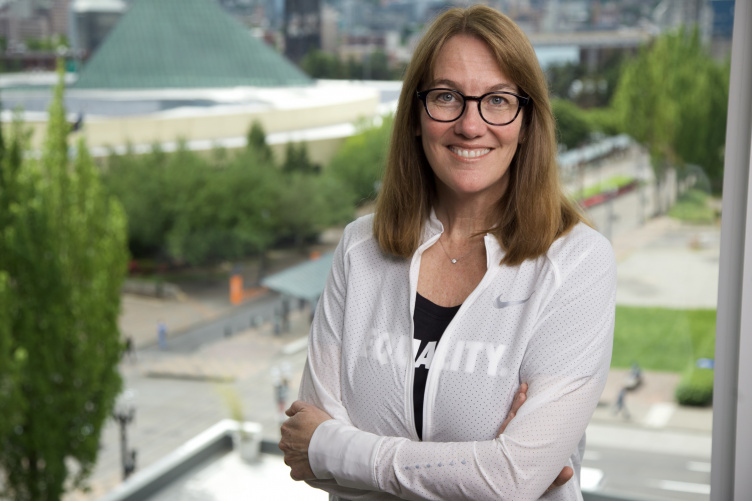
Paul College: Tell us about your history and role at Nike. What has inspired you to stay at Nike for as long as you have?
White: It was the summer of 1996, and all eyes were on the Atlanta Olympic Games, Michael Johnson and all the excitement surrounding his gold spikes. At the time, I was still living on the East Coast and received a call regarding a role in finance at Nike. Growing up just outside of Boston, I have been a huge sports fan all of my life. I decided to give it a chance and visit the Nike World Headquarters near Portland, Oregon. After the trip, I recall describing it to my dad as “Disney World for sports fans.” In other words, Nike had me at hello.
Over the next 22 years, I’ve had roles in finance, strategic planning, footwear product creation, running, and currently, global operations. Recently, I was given the opportunity to stand up a completely new function, demand and supply management. This new team integrates global retail, sales, and demand planning, along with end-to-end inventory management, and marketplace analytics capabilities.
I have remained at Nike because the business has never stopped challenging me to innovate and grow, and the people and culture have continued to energize and inspire me every day.
Paul College: What is Nike doing to facilitate the growth of women business leaders?
White: As the world’s leading sports and fitness brand, Nike has always supported women as athletes, and it is a company-wide priority to advocate to have a workforce as diverse as the athletes we serve.
In Global Operations, an organization with more than thousands of employees, we launched the Women of Global Operations three years ago with the main goal of building a more inclusive and diverse bench of future leadership. This team creates opportunities for mentorship, networking, outreach and training for all Global Operations employees, with a focus on elevating women in leadership roles in all Global Operations teams. As an executive sponsor of this group, and thanks to the full support of our COO and my colleagues on the operations executive team, I’m proud to say we have already had a measurable, positive impact on attracting and promoting female leaders.
Paul College: What can other companies learn from Nike, and what do you feel is the most important thing a company can do to empower women to seek leadership roles?
White: If you want more diversity in leadership, you need to make it a priority and commit to doing things differently. I personally think that strong mentors, both male and female, can play a big role in helping emerging leaders recognize their potential and guide them to make career choices that will match their ambitions. It may sound simple, but helping women to foster their networks and leverage mentoring relationships gives them the tools they will need to successfully navigate the corporate ladder.
Paul College: You’re also involved in an organization called AWESOME (Achieving Women’s Excellence in Supply Chain Operations, Management & Education), so this is clearly something you feel strongly about. When did you realize that businesses were not fully realizing the potential of women in leadership?
White: One of my colleagues at Nike, Trish Young, VP of ERP Integrated Value Streams, was among the first members of AWESOME, and currently serves on its board of advisors. Trish got me involved several years ago, when I joined the global operations team, and my first symposium was transformative. It’s hard to explain how inspiring it is to be in the company of more than 400 senior leaders from some of the world’s largest corporations, all of whom are intelligent, driven, compassionate women.
For someone who began her career in what was then, the very male-dominated field of public accounting, I had an early lesson on the glass ceiling. I had been one of the top-rated staffers, working on multinational corporations and most of the office’s largest clients, until I was promoted to manager. After my promotion, I followed in the footsteps of the women managers before me, with assignments on small not-for-profits and pension funds. I ended up leaving my company soon thereafter.
Paul College: We’re excited to have you as the keynote speaker for the 2018 Women in Business Conference at Paul College on April 13. What has inspired this kind of commitment to UNH and our future business leaders?
White: I am excited to join the conference and honored to be given the opportunity to speak. I have always been so grateful for my UNH education and experience. At the AWESOME Symposium in Chicago last May, there was an all-women’s panel of business school deans, discussing the future of women’s leadership and achieving gender equity in business education and beyond.
I was disheartened to learn that men still far outnumber women in undergraduate and graduate business programs. And even more troubling were the insights about the career progression of young women who began their careers on par with their male counterparts, but within five years had already fallen notably behind in compensation and advancement. This frustrating realization was still fresh in my mind when I had the chance to speak with Deborah Merrill-Sands, dean of the Peter T. Paul College, last summer. I learned about the focus Deborah has brought to raising gender equity as part of her agenda at Paul College, and I was compelled to become more involved.
Paul College: What does the future look like for women in business?
White: I recently finished reading Own It, the Power of Women at Work by Sallie Krawcheck. In the book, she makes a compelling case that business is evolving in ways that play to women’s strengths, where qualities women naturally possess, like communication and collaboration, will create significant opportunity. I agree, and that reminds me of a recent brand campaign at Nike: The Force is Female, where an all-female team of designers came together to reimagine two of the most recognized shoe silhouettes in history, the Nike Air Force 1 and the Air Jordan 1.
Companies, like Nike in particular, are continuing to recognize the magic that happens when you advocate for diverse, creative talent. This progress is helping close the gap for the future of women in business and that is what really excites me.
-
Compiled By:
Whittney Gould | Peter T. Paul College of Business and Economics | whittney.gould@unh.edu | 603-862-1704



















































